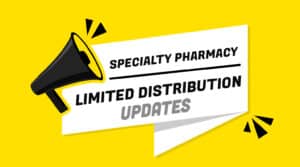We recently expressed our disappointment in the meager annual pharmacy trend reports now being offered by the leading PBMs. They once were the most insightful benchmark documents to help specialty pharmacies gauge the specialty pharmacy market.
However, there is one bright light on the trend report horizon, the Magellan Medical Pharmacy Trend Report. The new, 2020 report was recently released, and it is chock-a’-block full of great insights into what is happening in the most obscure segment of pharmacy, medical pharmacy spend.
The 2020 report has gone heavy into charts and graphs, which is great since many of the issues that fall under medical trend are more diffuse than under pharmacy trend. Some of the issues are easier to understand when they are color coded.
Specialty pharmacy has been a core element in medical pharmacy trend for years….. and is rapidly increasing. The fastest growing specialty pharmacies have all jumped into drug fulfillment under the medical benefit…. including buy-and-bill, direct distribution. Any specialty pharmacy interested in playing in that lucrative sandbox would be advised to download this report and use the insights as a road map to develop a strategy.
CLICK HERE TO DOWNLOAD THE 2020 MAGELLAN MEDICAL PHARMACY REPORT
Magellan Rx Management’s Medical Pharmacy Trend Report Unlocks the Latest Trends and Emerging Strategies to Manage Rising Medical Benefit Specialty Drug Spend
The 11th edition of this unique industry resource features surprising changes to the top commercial drug list
May 20, 2021, PHOENIX–(BUSINESS WIRE)–Magellan Rx Management, a division of Magellan Health, Inc. (NASDAQ: MGLN), released its eleventh annual Medical Pharmacy Trend Report, featuring a comprehensive view of provider-administered medical benefit drug trends—one of the largest drivers of total specialty drug spend.
“At Magellan Rx, we have a deep understanding of trends based on intricate knowledge and detailed analysis of medical benefit drug claims as well as current management approaches and innovative solutions that are being deployed to combat rising costs while maintaining quality care for patients.”
Through 11 years of market evolution and claims data trends, the Report highlights how total medical benefit costs and per-member-per-month (PMPM) trends have continued to rise. Since the first edition of the Report, commercial PMPM has nearly doubled. Market dynamics have evolved significantly, including the introduction and growth of biosimilars, and the science has advanced faster than ever with new mechanisms of action, novel therapies for orphan diseases, targeted oncology therapeutics, and the introduction of gene therapy. These innovations have helped countless patients, while also presenting new complexities for managed care organizations and clinicians. These challenges are why it is critical for payers to be increasingly focused on managing drug spend on the medical benefit.
“These trends continue to be a challenge for all stakeholders involved in the care of patients with complex specialty conditions, making it vital for them to stay current and informed for better decision-making,” said Kristen Reimers, RPh, senior vice president, specialty clinical solutions, Magellan Rx Management. “At Magellan Rx, we have a deep understanding of trends based on intricate knowledge and detailed analysis of medical benefit drug claims as well as current management approaches and innovative solutions that are being deployed to combat rising costs while maintaining quality care for patients.”
Key Findings and Trends in the 2020 Report
The top five commercial drugs are now: Remicade, Neulasta, Ocrevus, Rituxan, and Herceptin. This is a historic shift—after a decade of Remicade, Neulasta, Rituxan, Herceptin, and Avastin being the top-five drugs, Avastin has been replaced by Ocrevus (No. 3).
Biosimilars Renflexis and Inflectra in the Biologic Drugs for Autoimmune Disorders (BDAIDs) category are making an impact with a 4-6 percentage point increase in market share for commercial and Medicare and a substantial 24 percentage point increase in Medicaid. The average annual cost per patient for these agents were 22-28 less than the reference product, Remicade.
Colony stimulating factors (CSFs) in Medicare and Medicaid experienced a decline in spend, potentially attributed to a decrease in the use of cytotoxic chemotherapy. This reduction in the use of cytotoxic agents drove higher oncology spend as use of immunotherapy and monoclonal antibody (MoAb) drugs increased.
Driven by the decrease in CSF cost and spend, oncology support spend is forecasted to decrease by 32% over the next five years—the only category profiled with a steady reduction in cost.
The oncology pipeline had more than 700 drugs in clinical trials in 2019 and is forecasted to increase 105% in PMPM spend from $52 in 2019 to $106 in 2024.
This Report is just one of the ways Magellan Rx keeps the market updated on the latest trends for medical benefit drugs. To learn about Magellan Rx’s 16+ years of experience and commitment to developing innovative clinical programs that address these trends and help payers stay ahead of the curve to improve overall cost and quality, click here to read about the company’s total specialty drug management approach and medical pharmacy solutions.






